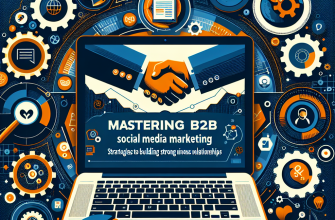Exploring the Pros and Cons of Social Media Marketing Strategies: A Comprehensive Guide
In the ever-evolving landscape of digital marketing, social media stands out as a dynamic and powerful tool for businesses aiming to enhance their visibility and engage directly with their audience. As a digital marketing expert, I’ve observed firsthand the transformative impact that social media can have on a brand’s growth and customer relations. However, like any marketing strategy, social media marketing comes with its own set of challenges and considerations. Let’s delve into the pros and cons of leveraging social media for business growth and engagement.
The Pros of Social Media Marketing
1. Increased Brand Awareness
Social media platforms offer a unique opportunity for brands to gain visibility with minimal financial investment. With billions of users across platforms like Facebook, Instagram, Twitter, and LinkedIn, the potential to reach a vast audience is significant. By consistently posting engaging content, companies can increase their brand recognition and recall.
2. Enhanced Customer Engagement
Social media is not just a broadcasting tool; it’s a two-way communication channel. Brands can interact directly with their customers, respond to their queries in real time, and engage with them in discussions. This level of interaction builds stronger relationships and loyalty, which are crucial for customer retention and conversion.
3. Targeted Advertising
Social media platforms offer advanced targeting options, allowing businesses to tailor their advertising campaigns to specific demographics, locations, and interests. This precision leads to higher conversion rates as ads are shown to those most likely to be interested in the products or services offered.
4. Valuable Insights and Analytics
With robust analytical tools provided by platforms like Facebook Insights and Google Analytics, businesses can track the performance of their posts and ads, understand customer behavior, and refine their strategies accordingly. These insights are invaluable for making data-driven decisions that can enhance marketing effectiveness.
5. Cost-Effectiveness
Compared to traditional marketing channels like television or print media, social media marketing is relatively inexpensive. This makes it particularly advantageous for small to medium-sized enterprises (SMEs) that may have limited marketing budgets but still want to achieve significant market penetration.
The Cons of Social Media Marketing
1. Time-Consuming
Creating, curating, and posting content that stands out can be incredibly time-consuming. Additionally, engaging with customers, monitoring feedback, and managing social media accounts require a significant time investment. For small businesses, this can be a substantial strain on resources.
2. Requires Constant Updates
Social media is dynamic, with trends and algorithms changing frequently. What worked last month might not work today. Businesses need to stay updated and adapt their strategies regularly, which can be challenging and resource-intensive.
3. Risk of Negative Feedback
Social media platforms are public forums where anyone can voice their opinions. Negative comments or reviews can spread quickly and potentially damage a brand’s reputation if not managed properly. Effective crisis management strategies are essential to mitigate these risks.
4. High Competition
Virtually every business is on social media, which means the competition is incredibly high. Standing out in a crowded marketplace requires creativity, innovation, and sometimes a significant budget, particularly when it comes to paid advertising.
5. Measuring ROI Can Be Difficult
While social media platforms provide analytics, measuring the precise return on investment (ROI) for social media activities can be complex, especially when it comes to correlating social media efforts with real-world outcomes like sales or revenue growth.
Navigating the Complexities
To effectively leverage social media marketing despite these challenges, businesses should consider the following strategies:
- Develop a Clear Social Media Strategy: Define what you want to achieve, whom you want to reach, and how you plan to engage them. This strategy should align with your overall marketing and business goals.
- Use the Right Tools: Leverage social media management tools like Hootsuite, Buffer, or Sprout Social to schedule posts, monitor mentions, and track engagement. These tools can save time and help streamline social media operations.
- Engage Rather Than Sell: Focus on building relationships and engaging with users rather than just selling your products or services. Content that adds value—be it through information, entertainment, or support—tends to perform better.
- Monitor and Adapt: Keep an eye on performance metrics and be ready to tweak your strategy based on what the data tells you. Also, stay informed about the latest social media trends and algorithm updates.
- Plan for Crisis Management: Have a crisis management plan in place to deal with negative feedback or public relations issues effectively and swiftly.
In conclusion, while social media marketing is an essential tool in the digital marketer’s arsenal, it is not without its challenges. By understanding these pros and cons and strategically planning your approach, you can maximize the benefits of social media marketing and turn potential drawbacks into opportunities for growth and engagement.

A seasoned digital marketing strategist with over 8 years of experience across various areas of digital marketing, including SEO, SMM, PPC, content marketing, and email marketing. Specializes in transforming B2B, B2C, e-commerce, and SaaS businesses by creating effective go-to-market strategies and building thriving digital ecosystems. Known for a data-driven approach to optimizing campaigns and maximizing results.
“If your business is looking to scale or in need of a fresh perspective, feel free to contact”.



